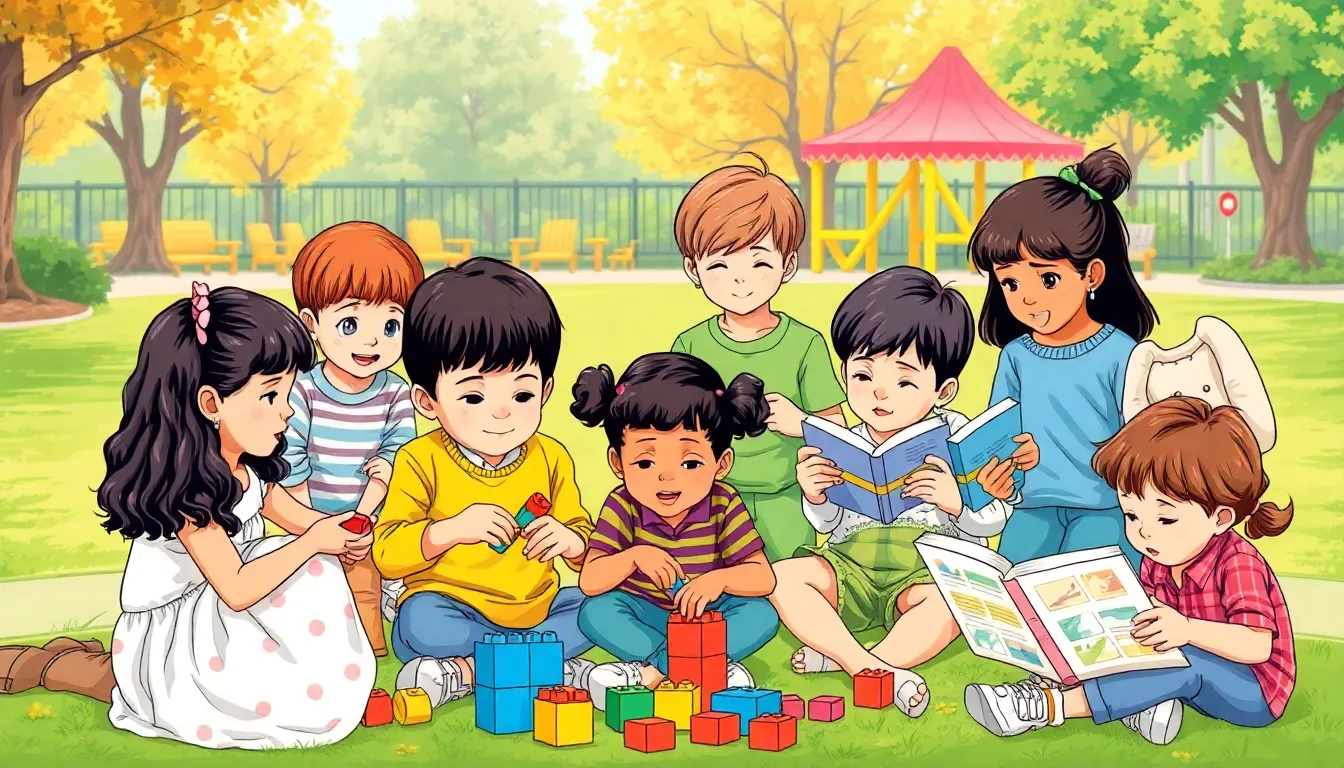Child development is a wild ride filled with giggles, tantrums, and those heart-melting moments that make parents question their sanity. From the first wobbly steps to the epic battles over broccoli, every stage is a unique adventure. Understanding how children grow and learn isn’t just for the experts; it’s essential for anyone who’s ever dealt with a tiny human armed with a crayon and a questionable sense of decorum.
Table of Contents
ToggleOverview of Child Development
Child development encompasses a wide range of physical, cognitive, social, and emotional milestones. These milestones serve as indicators of a child’s growth and progress. Early stages include infancy, where basic motor skills develop, and toddlers, who refine their walking and coordination abilities.
During preschool years, children experience rapid cognitive growth. They expand their vocabulary and engage in imaginative play, which fosters creativity. Social interactions also become more significant, as children learn to share and cooperate with peers.
In the school-age phase, academic skills emerge. Children start reading, writing, and solving basic math problems. They also develop a sense of identity and self-esteem, influenced by their experiences at home and school. Peer relationships become increasingly important, shaping their social skills.
Adolescence represents a transitional period with physical changes and greater independence. Emotional challenges may arise as teenagers explore their identities and navigate complex social dynamics. Communication skills mature, allowing for more profound relationships with family and friends.
Monitoring developmental stages helps caregivers provide appropriate support. Recognizing the typical age range for specific milestones aids in identifying any potential delays. By understanding these phases, caregivers can foster an environment that promotes healthy development.
Research indicates that early interventions are beneficial for children who exhibit developmental delays. With more than 15 percent of children experiencing delays, timely support can lead to improved outcomes. Emphasizing positive reinforcement and nurturing relationships contributes to a child’s overall well-being and success.
Stages of Child Development

Understanding the stages of child development provides a framework for recognizing growth patterns. Each phase highlights unique milestones contributing to a child’s overall well-being.
Infancy
Infancy spans from birth to approximately 12 months. During this stage, infants develop essential motor skills, such as reaching and grasping. They respond to sensory stimuli, demonstrating early communication through cries and coos. Vision improves, allowing babies to recognize faces and objects. Cognitive development unfolds as they explore surroundings with curiosity. Parents play a crucial role in fostering a secure environment that encourages exploration and bonding.
Early Childhood
Early childhood covers ages 1 to 6 years. This period features rapid advancements in physical abilities, such as walking, running, and jumping. Vocabulary expands significantly, allowing children to express thoughts and feelings. Social skills emerge as kids learn to share, cooperate, and engage in imaginative play. Emotional development also progresses, with children starting to understand their own feelings and those of others. Support from caregivers during this stage nurtures confidence and a sense of belonging.
Middle Childhood
Middle childhood occurs from ages 6 to 12 years. Children refine academic skills, mastering reading, writing, and basic mathematics. Peer relationships gain importance, influencing social behavior and self-esteem. During this phase, problem-solving abilities enhance, as well as critical thinking skills. Independence grows, with kids showing preference for activities and interests. Parents can foster growth by encouraging involvement in sports, arts, and group activities.
Adolescence
Adolescence ranges from ages 12 to 18 years. This stage brings significant physical, cognitive, and emotional changes. As teenagers develop a stronger sense of identity, they navigate complex social dynamics and peer influences. Emotional challenges often arise due to the pursuit of independence and self-discovery. Effective communication becomes essential for parents to support their teenagers during this transitional period. Understanding these challenges contributes to healthier family relationships.
Factors Influencing Child Development
Various influences contribute to how children develop across different stages. Understanding these factors proves crucial for providing the necessary support.
Genetic Factors
Genetic factors play a significant role in child development. Hereditary traits affect physical attributes like height and weight. Genetics also influence cognitive abilities and potential health issues. Certain developmental disorders often stem from genetic conditions. Families with a history of specific traits may see similar patterns in their children, highlighting the importance of genetic predispositions.
Environmental Factors
Environmental factors encompass a child’s surroundings and experiences. Home environments with adequate nutrition, stimulation, and safety encourage healthy growth. Exposure to toxins or unsafe conditions can hinder development. Socioeconomic status represents a critical environmental factor, as access to resources impacts educational and health outcomes. Communities that provide supportive services foster better development in children.
Social Factors
Social factors significantly shape a child’s development. Relationships with family members contribute to emotional security and social skills. Peer interactions during play promote cooperation and conflict resolution. Cultural backgrounds influence the values and behaviors children adopt. Active participation in group activities enhances children’s sense of belonging, fostering identity formation. Positive social environments foster resilience against external challenges.
The Role of Parents in Child Development
Parents play a crucial role in shaping their child’s development. They influence physical, cognitive, social, and emotional growth through daily interactions. Engaging in positive communication fosters language skills and emotional understanding. Active involvement in a child’s education enhances academic achievement and self-esteem.
Nurturing environments contribute to resilience and identity formation. Offering support during challenging moments builds a child’s confidence. Modeling appropriate behaviors establishes norms for social interactions. Providing a structured routine helps children feel secure and enables them to thrive.
Research shows that children with engaged parents demonstrate better outcomes in various developmental milestones. Monitoring progress through observable behaviors aids in recognizing potential delays. Early identification of issues allows for timely interventions, significantly impacting long-term success.
Parents can promote healthy habits by modeling nutritious eating and physical activity. Encouraging participation in extracurricular activities broadens social skills and friendships. Being aware of peer influences helps guide children through complex social dynamics.
In the adolescent stage, effective communication remains essential for maintaining strong relationships. Parents should foster an open dialogue, allowing teenagers to express their feelings and concerns. Understanding the emotional challenges teenagers face promotes empathy and connection.
A supportive and loving environment nurtures a child’s growth. When parents remain involved, they create a foundation for lifelong learning and emotional security. Through intentional actions, parents can significantly influence their child’s development journey.
Child development is a multifaceted journey that requires attention and understanding at every stage. Recognizing the milestones and challenges children face empowers caregivers to provide the right support. A nurturing environment fosters resilience and emotional security essential for healthy growth.
Parents play a pivotal role in shaping their child’s experiences through positive interactions and active involvement. By promoting healthy habits and open communication, they can help children navigate the complexities of their developmental phases. Investing time and resources in understanding child development leads to stronger family bonds and better outcomes for children. As they grow, the right support can make all the difference in their journey toward becoming confident and capable individuals.

